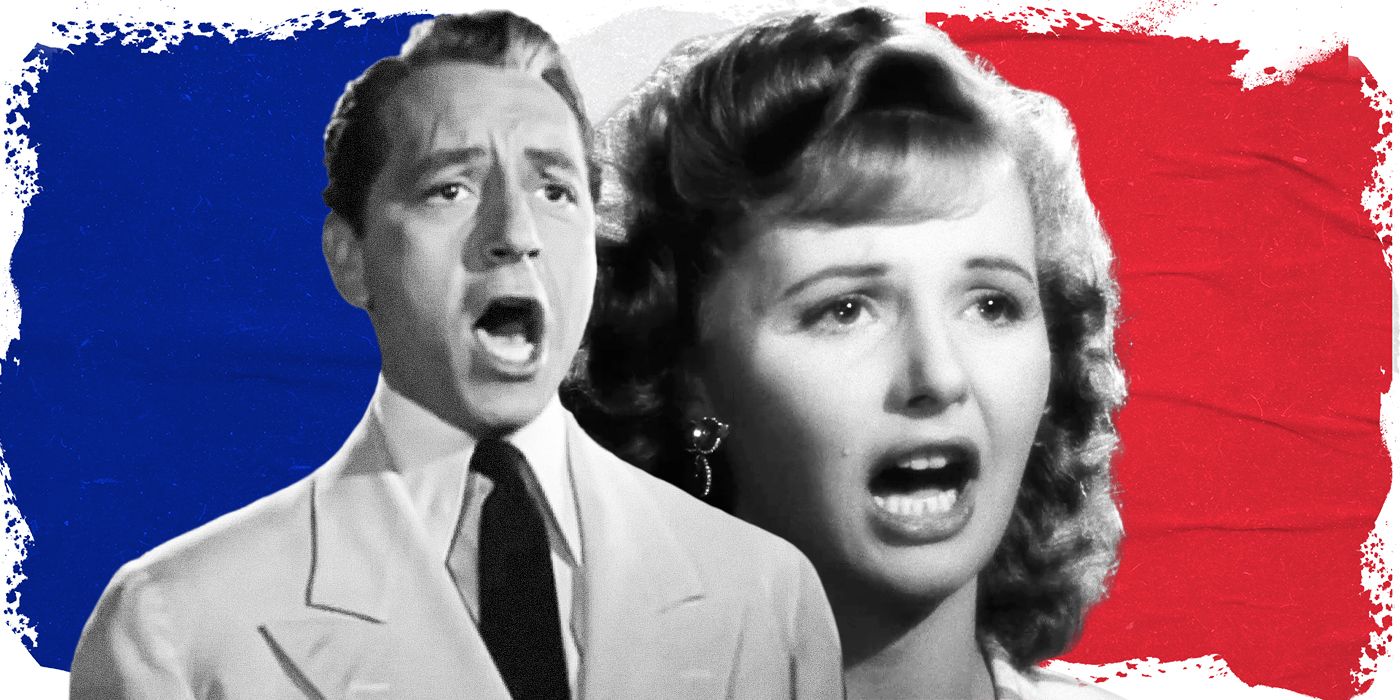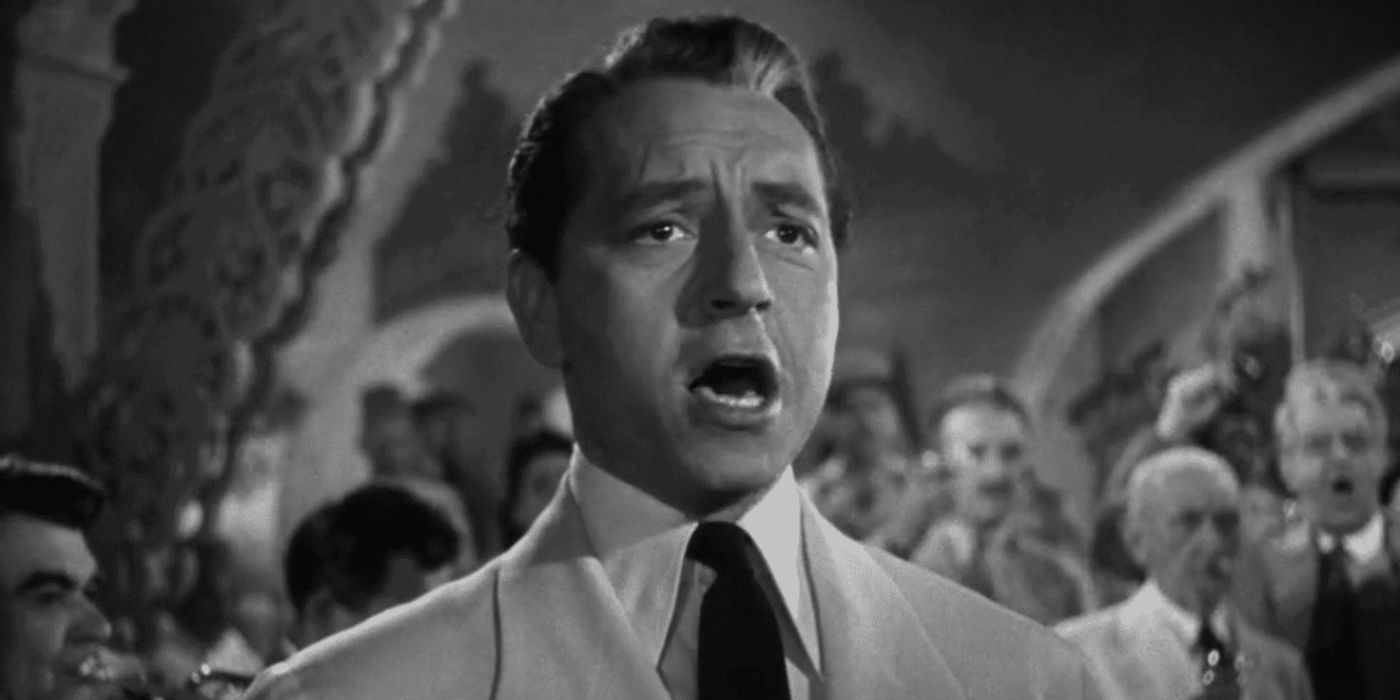Countless moviegoers and critics alike consider Casablanca (1942) a masterpiece in most regards. One would be hard-pressed to find a cinephile unfamiliar with those iconic quotes or the tortured, timeless romance of protagonists Rick (Humphrey Bogart at his most gallant) and Ilsa (Ingrid Bergman at her most radiant), and rightfully so. Casablanca's enduring significance 80 years later is a testament to its script — simultaneously sparkling and dour — and an unfortunately still relevant thematic resonance.
Choosing a "best" scene among the multiplicity of stand-out moments in the film is the definition of being spoiled for choice, because Casablanca really is just that well-written. Nevertheless, one instance distills the film to its essence. The few minutes when the patrons of Rick's Café defiantly sing the French national anthem in the presence of Nazi officers carries layers of narrative meaning and emotional grounding, evidenced through both the extras and the silent primary characters. And it's all conveyed without prioritizing Casablanca's bittersweet love story.
Setting the Stage for Revolution
The "dueling anthems" interrupts an argument between Bogart's abrasive Rick and Victor Laszlo (Paul Henreid), Ilsa's husband and a resistance leader wanted by Germany. Rick continues to lay the blame for his misery at Ilsa's feet and her sudden reappearance with a surprise spouse in tow only increases his vitriol toward the world. He's a former rebel without a current cause beyond his own lonely survival, as empty as such a thing is amidst a war. Denying Ilsa's husband safe travel across German-occupied Europe is Rick exerting what little power his position in Casablanca affords him, and he wields it as a weapon against the woman who left him broken. "Ask your wife," Rick growls when Laszlo demands a reason for Rick's refusal.
All three characters (and the plot) have crashed into a standstill that mirrors Rick's meaningless wallowing in the past and the refugees stranded in Casablanca itself. The latter are downtrodden and exhausted, trapped in the emotional cycle of hoping each day will be different as much as they're physically trapped by Germany's domination.
A group of Nazi soldiers proudly belting the German patriotic anthem "Die Wacht am Rhein" interrupts Rick and Laszlo's confrontation. On a meta level, the piece is an especially heinous choice given its association with the centuries-old French-German conflict and the Vichy's control over Casablanca. Narratively, it's further emotional violence against Rick's refugee patrons. Rick's jaw tightens in silent fury; his self-imposed policy of non-interference demands he accept the insult and live to see another day. Laszlo, meanwhile, channels his outrage by ordering the house band to "play La Marseillaise," the French national anthem.
The entire establishment instantly leaps to their feet and joins Laszlo's in song, and the German Major Heinrich Strasser (an impeccable Conrad Veidt) tries and fails to overpower the peoples' voices rising above totalitarianism. This is a socially small yet immense act of defiant resistance and demonstrates the power behind traditions and symbols. The dismayed refugees in Casablanca feel uplifted and therefore inspired into endurance. A shot holding on Rick's former lover, Yvonne (Madeleine Lebeau), is especially moving given her romantic affiliation with a Nazi soldier and actress Lebeau's status as a refugee herself.
'Casablanca' Suggests That the Greater Good Requires Personal Sacrifice
The scene’s placement within Casablanca's narrative structure is no accident. It represents the decisions both the characters and society face during a fascist assault on freedom, similar to how Yvonne needing an external force to coalescence her courage into action foreshadows Rick's upcoming emotional sacrifice. Plot-wise, the moment prompts Strasser to close Rick's and hunt Laszlo. "If Laszlo's presence in a café can inspire this unfortunate demonstration," he says to Captain Louis Renault (Claude Rains), "what more will his presence in Casablanca bring on?" Much like in real life, witnessing such unification causes the powerful corrupt to panic.
The active threat against her husband will force Ilsa's hand, but as she watches him courageously lead the rapturous crowd in "La Marseillaise," Ilsa's a study in fear. Initially afraid for their safety, her face softens into affectionate admiration. She remembers the reason she fell for him and realizes his passionate example is worth more than the narrow priority of her personal jeopardy. This moment is why Ilsa belongs with her husband, not Rick. She illustrates how sacrifices are rooted in personal choice, even if Rick chooses for her and remaining with Laszlo is a truth she needs time to understand.
"La Marseillaise" also marks the catalyst for Rick's evolution. He recognizes how Laszlo ignites hope and that one man might change the course of the war — as long as this one woman remains by his side. Admiring the love of his life's husband is a pivotal shift in Rick's reignited morality and the primary reason he lets the couple go and rejoins the fight with conviction. Rick is, after all, at heart a sentimentalist; he always remembered the difference between right and wrong underneath that cruel, narcissistic shell. He had just capitulated to his own grief in tandem with obeying Germany's overwhelming force. Re-embracing his rebellious nature means surrendering Ilsa and making himself vulnerable again instead of a man-made isolationist island. In the end, hiding his head under the metaphorical sand helps no one, least of all himself.
Although not directly stated (Casablanca's script avoids lazy explanations), the dueling anthems also mark the turning point for Captain Renault, who up to this point was a spineless collaborator profiteering off others' disadvantage. His prior actions are indefensible, yet Rains' infuriatingly charming performance turns Renault into a fellow sentimentalist about his one and only friend. Rick's choices force Renault out of his inaction. Setting aside his easy life and prosperous corruption doesn't erase his previous laissez-faire practices, but his contributions to the war effort are different from Rick's and born from different reasons. Sacrifice doesn't always equate to losing the individualism of courage.
Much Like 'Casablanca' Itself, the "La Marseillaise" Scene Prioritizes the Wider World
When the right script meets the right creatives at the right time, movie magic can work wonders. No one involved with Casablanca expected a film churned out by the Hollywood system during the uncertainty of World War II to make a lasting impact. The "La Marseillaise" scene may involve the romance's participants, but it isn't about them — its focus is the wider film, just like the characters set aside their ambitions when demanded by a higher calling. Its deliberate editing and thematic resonance represents everything that makes Casablanca still affecting, and truly one of the greatest films ever made.



